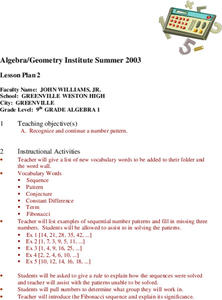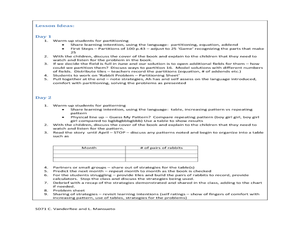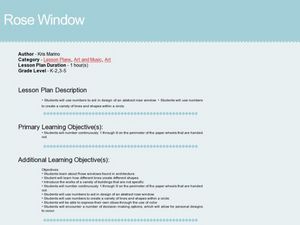Curated OER
Two-Dimensional Drawings from Three-Dimensional Objects
Sixth graders identify and draw two-dimensional representations of a three-dimensional object. Students investigate the views of an object and determine that three views are required (front, one side and the top). Students use these...
Curated OER
Ten Important Hardwoods
Students discuss ten important Pennsylvania hardwood trees, examine characteristics of each tree species, evaluate economic and ecological importance of hardwood trees, and recognize at least two characteristics of each species.
Curated OER
Counting Zero to Five
Students are introduced to the numerals zero through five. They associate the numeral with the correct number of objects. Students comprehend the quantities zero through five showing "How many?" by counting their fingers or using a...
Curated OER
Ten Crucial Days- George Washington as a Hero Figure
Students identify the heroic qualities of George Washington. For this Revolutionary War lesson, students recognize heroic qualities and construct a Hero Hall of Fame. Students construct posters that exemplify heroic traits.
Curated OER
Leapin' Landmarks: Locating 10 Man-made Landmarks Around the World
Third graders label continents, oceans, and major mountain ranges on maps and use the maps to write an informational report about landmarks. In this landmarks lesson plan, 3rd graders write about 1 major landmark.
Curated OER
Patterns and Sequences
Ninth graders examine sequential number patterns and the Fibonacci sequence. Given number patterns, they determine the next number in a sequence. Students develop their own number patterns and exchange them with another to be solved.
Curated OER
Ten Cents a Word
Learners recognize the importance of summarizing in this lesson. They "sum up" an article about monarch butterflies. Students practice writing summaries of the article charging themselves 10 cents/word. They try to write the least...
Curated OER
Two Plus Two
Students solve simple math problems in the target language using words instead of numberals. They use the appropriate interpretive strategies to compute in the taget language. Students use complex language structures to solve the...
Curated OER
2, 4, 6, 8 . . .What Do We Appreciate-Patterns, Patterns, Patterns
Learners discover and predict patterns in a numerical sequence. Through the Internet and video segments, students begin with basic number patterns and extend their knowledge into higher math skills. They will also create new patterns...
Curated OER
Three Wishes
Second graders make three wishes in order to help them decide what is important to them and compare it to what is important to others.
Curated OER
Recognize Triangles
In this shapes worksheet, students are asked to "colour" all of the triangles they find on the page. There are 10 shapes on the page and 4 are triangles. The second page contains suggestions for teachers on activities with 2-D shapes.
Pennsylvania Department of Education
Comparing Two Versions of The Mitten
Students listen to two versions of the story The Mitten and create a chart or a Venn Diagram to compare the two versions. For this literary comparison lesson, students create a chart or Venn Diagram and discuss the differences in...
Curated OER
The Rabbit Problem
Young scholars notice a number pattern in the book The Rabbit Problem by Emily Gravett. In this number pattern lesson, students represent and describe numbers appropriate to their grade level.
Curated OER
English Exercises
In this recognizing animal names reading instructional activity, 1st graders name 10 animals. A word bank of the animal names is provided and students must write the name to match each animal picture.
Curated OER
Creating Rose Windows
Students view a multimedia presentation to recognize rose windows and quilting patterns. In this rose window perimeter instructional activity, students design rose window from paper. Students review prior knowledge of lines and how they...
Curated OER
Part of a Whole Group
In these two recognizing fractions worksheets, students review examples, observe boxes with two different kinds of things, and use them to write each part as fractions. Next, they circle items to make groups to use to complete number...
Curated OER
Agriculture Pays
Second graders role play one of the jobs related to agriculture and explain their role in getting one of the five "f's" of agriculture to the consumer. In this agriculture lesson, 2nd graders are assigned a role and a...
Curated OER
Identifying Prepositions
In this recognizing prepositions in sentences activity, students underline one or two prepositions in each sentence. Students underline 14 answers.
Curated OER
Which Word Doesn't Belong?
In this recognizing categories activity, students read groups of four words and identify the one that does not belong in each group. Students choose 10 answers.
Curated OER
The Smallest Metric Measurements
In this recognizing metric measurements worksheet, students read groups of three measurements and identify the one that is the smallest. Students solve 15 problems.
Curated OER
Truman Capote: Other Voices, Other Rooms
Young scholars read and analyze Truman Capote's autobiographical short story, "A Christmas Memory." They discuss writing styles, conduct Internet research on Truman Capote, write a book review, and write a short story based on one of...
Curated OER
Stress Day
Students identify the causes and symptoms of stress, and describe positive forms of stress management. They identify when they are stressed and look at techniques to help them decrease their stress. They realize one stress isn't bad,...
Curated OER
Biodiversity and Ecosystems
Middle schoolers differentiate between biotic and abiotic factors in this science lesson. Learners collect data for the experiment and analyze the data after graphing it using the CBL 2. This experiment is split into two different...
Curated OER
Antonyms
In this recognizing words with opposite meanings activity, students read descriptive phrases in one column and match their antonyms in the second column. Students match 12 answers.























